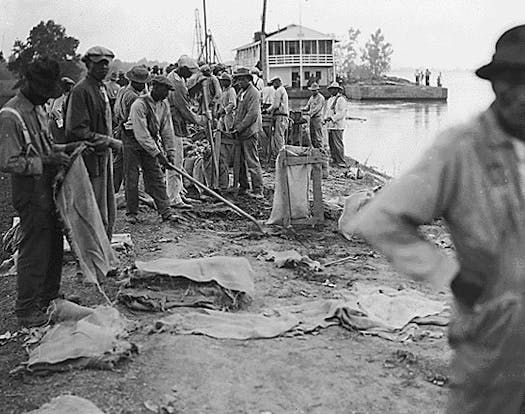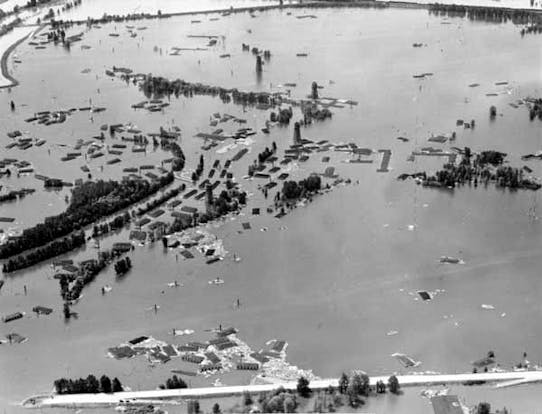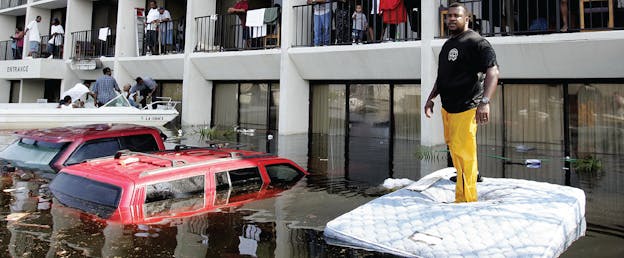April, 1927
The Great Mississippi Flood: Heavy rains cause the Mississippi River to break through its levee system, leading to the establishment of relief camps for the displaced, which are primarily black families. Then-Secretary of Commerce Herbert Hoover’s relief operations are widely praised, though information regarding the poor treatment of black camp residents arises after he is elected President in 1928.

July 20, 1927 After the Flood
"The more we learn of the conditions in the wake of the disaster, the more certain it appears that the economic rehabilitation of the flooded regions is also likely to require federal aid. In refusing, as he has done, to call a special session of Congress to cope with this problem, President Coolidge has taken upon himself a truly terrible responsibility. We shall be lucky if the assistance, when it does come, is not so late that needless additional misery is suffered because of its tardiness."
1928
In response to the Mississippi flood, Congress passes the Flood Control Act of 1928, authorizing the U.S. Army Corps of Engineers to build the world's then-longest system of levees.
March, 1936
Pittsburgh Flood of 1936: As the Senate debates another flood control bill to create reservoirs above Pittsburgh, tremendous flooding sweeps through the city. Its effects are felt from Hampshire down to Washington, DC.
April 1, 1936 Man-Made Floods
"But it is now clear, both that floods are interstate matters, and that the states acting individually will not and probably cannot take adequate action. If President Roosevelt really wants, as he says, to make America a better land to live in, here is an immediate and urgent task, which includes making some parts of America a land in which people can live at all."
January, 1937
One million are left homeless after the Ohio River floods. Federal and state governments struggle respond due to Depression-era budget constraints.
Feburary 3, 1937 Flood
"We can prevent flood damage if we are willing to pay the price; it means billions spent on soil conservation, billions more on flood control and the inauguration of city, state and regional planning on a scale never contemplated thus far."
May, 1948
Vanport Flood: Vanport, a predominately black public housing project outside of Portland, Oregon, is completely destroyed when a dike holding back the Columbia River collapses.

July 5, 1948 The Real Vanport Disasters Housing
"As the passenger trains again run along the railway embankment that collapsed five weeks ago, causing total destruction to a city that once had housed 42,000 war workers, passengers look with mild curiosity at the "city of water." Portland residents, who opened their hearts and homes to the flood victims, are beginning to grumble now: "When are the refugees going to find their own homes? They can't stay on here forever."
1965
The Flood Control Act of 1965: After Hurricane Betsy ravaged Louisiana earlier in the year, Congress switches control of flood protection system from Louisiana state levee boards to the U.S. Army Corps of Engineers. The protection system that they begin working on is scheduled to be completed by 2015.
April, 1979
Easter Flood: The flooding of Mississippi’s Pearl River results in the most costly and damaging flood in the state to date, pushing 17,000 out of their homes.
May 12, 1979 After the Flood
"This was the first flood to hit the affluent white areas along the river…The local news coverage focused mostly on how the flood affected these parts of Jackson. "You would have thought only white homeowners got flooded," says L. C. Dorsey, a black woman who lives near Doodleville. "Blacks from other parts of town called and said, 'Y'all must not have gotten it this time.'"
August, 2005
Hurricane Katrina becomes the costliest natural disaster in U.S. history. The hurricane protection failures lead to a lawsuit against the U.S. Army Corps of Engineers, who are still working on the protection system they began in 1965.
September 19, 2005 Katrina
"Americans are always so shocked when they turn out not to be exceptions to the universe. Their president also: 'The people we're talking about are not refugees,' President Bush insisted. But they are plainly refugees, and these refugees will be a feature of American life in many states for many months and even years to come. When was the last time that the noun 'refugee' was modified by the adjective 'American'? So the Americanist innocence, too, was drowned in Katrina's waters. Our invulnerability is not perfect. The storm beat us."
October 2012
Hurricane Sandy: "Superstorm Sandy" affects 24 states in the U.S., causing particularly severe damage in New Jersey and New York. The storm surge that hits New York City floods subway tunnels and streets, and leads to massive power outages in and around the city.
November 16, 2012 Who By Water
"I marveled at the mayor's skill in evading any accountability for the city's lack of preparedness and quickly wearied of his cashmere swagger. How can anybody named Bloomberg be so utterly lacking in the common touch? The class analysis of the city's ordeal, this latest and most extreme illustration of Manhattanism, was hard to refute. The center was dining and damn the peripheries."
June 25, 2015 After the Deluge
"Hurricane Katrina was, for many Americans, the first introduction to climate justice in both theory and practice: The poor and powerless were more vulnerable to the extreme weather events that increasingly define a warmer, wetter planet than were the wealthy… The Gulf Coast is where the world can see climate justice made plain."

